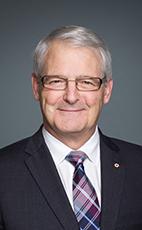Mr. Speaker, the Government of Canada’s top priorities are safety and security. Transport Canada’s primary mission is to serve the public interest by promoting a transportation system in Canada that is safe, secure, efficient, and environmentally responsible.
The minister does not approve projects. Rather he will, according to subsection 4.31(1) of the Aeronautics Act, make an order prohibiting the development or expansion of a given aerodrome or any change to the operation of a given aerodrome, if, in the minister’s opinion, the proposed development, expansion, or change is likely to adversely affect aviation safety or is not in the public interest.
Transport Canada is aware of the concerns that can arise in relation to the development of new aerodromes across Canada, including the project that is currently being developed within the municipalities of Mascouche and Terrebonne.
This is what notably motivated the Minister of Transport’s decision on March 4, 2016, to issue a ministerial order under the Aeronautics Act to prohibit the development of all new aerodromes in the cities of Mascouche and Terrebonne and to require the Corporation de l’aéroport de Mascouche, the Corporation, to hold a full public consultation on the project. The Corporation complied with the requirements of the order and sent Transport Canada all of the comments and documents—including the ones from the Cities of Mascouche and Terrebonne—that were submitted as part of the formal consultation process.
The department thoroughly examined all of the documentation and arguments submitted with regard to the project, both positive and negative, as well as the mitigation measures proposed by the Corporation, in order to address the population’s concerns.
A number of factors were considered in the project’s overall evaluation, including compliance with regulatory requirements, aviation safety, the project’s economic impact, environmental protection, and public and private interests.
The department conducted on-site verifications, reviewed the preliminary plans and the report on the public consultation held by the proponent, as well as the obstacles, all in accordance with TP312, Aerodrome Standards and Recommended Practices, and TP1247, Land Use in the Vicinity of Aerodromes in effect.
This thorough review of the project allowed Transport Canada to ensure that flight operations will be conducted safely, while having a significant economic impact on the region. To illustrate this last point, the former Mascouche airport’s flying schools employed over 50 people and trained some 185 students in 2016. Over the past two years alone, Transport Canada has issued 116 private pilot licences and 63 commercial pilot licences to candidates from these schools.
There are no public funds involved in this project. The department’s work related to the matter has not incurred any additional costs beyond those for regular operations.
It should be noted that part III of the Canadian Aviation Regulations, subpart 7(307), on consultations for aerodrome work, came into effect on January 1, 2017. Therefore, under these regulations, aerodrome proponents must now consult the interested parties and the communities before developing a new aerodrome or before making major physical changes to an existing aerodrome. No amendments to these regulations or to the department’s evaluation process are currently planned.

